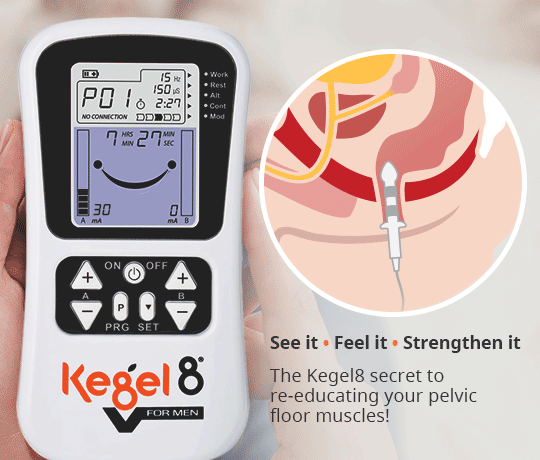
Prostate problems become more common with age. The prostate is a small gland located below the bladder and in front of the rectum. Here are some key signs of a prostate problem:
Frequent urination: experiencing the need to urinate more frequently, especially during the night (nocturia) could be a prostate problem, or it could be a sensitive bladder. Nerves can be calmed easily at home using eStim but an accurate diagnosis is required first.
Urination hesitation: Difficulty starting urination or the experience of a weak or interrupted urine stream.
Weak urine stream: The flow may be weaker than usual, even when the bladder feels full.
Incomplete emptying of the bladder: After urination, there may be a feeling of not fully emptying the bladder.
Urinary urgency: a sudden, intense urge to urinate, making it difficult to hold back.
Dribbling at the end of urination: After finishing urinating there might be dribbling or leakage.
Pain or discomfort during urination: Prostate problems can cause pain or burning sensations during urination.
Blood in urine or semen: In some cases, there may be blood present in the urine or semen.
Erectile dysfunction: Prostate issues can also lead to difficulties achieving or maintaining an erection.
Pain in the lower back, pelvis, or thighs: Discomfort or pain in these areas may be associated with prostate problems.
These symptoms are not exclusive to prostate problems, so an accurate diagnosis is essential. These symptoms can be caused by various conditions such as benign prostatic hyperplasia (BPH), prostatitis (inflammation of the prostate), prostate cancer, or a sensitive bladder. Seek medical advice from a healthcare professional who can perform a proper evaluation and provide a correct diagnosis.
Can I test for an enlarged prostate?
Yes, a Prostate-specific antigen (PSA) blood test: This test measures the level of PSA in the blood. Elevated PSA levels can indicate prostate conditions, including BPH (Benign prostatic hyperplasia), also known as enlarged prostate, an infection. or prostate cancer. You can perform a 10 minute home blood test before seeking further medical advice to make sure your PSA levels are elevated.
Does a GP still do a digital rectal examination?
Here in the UK a digital rectal examination (DRE) is commonly performed, where the doctor inserts a gloved, lubricated finger into the rectum to assess the size and condition of the prostate gland.
What can I do to avoid prostate problems or an enlarged prostate?
While prostate problems, particularly benign prostatic hyperplasia (BPH), are common in men as they age, there are some lifestyle changes and habits that may help reduce the risk or minimize the impact of prostate-related issues. Here are some tips to promote prostate health:
Maintain a Healthy Diet: Eat a balanced diet that includes a variety of fruits, vegetables, whole grains, and lean proteins. Some studies suggest that a diet rich in fruits and vegetables may be associated with a lower risk of prostate problems.
Exercise Regularly: Engage in regular physical activity to maintain a healthy weight and overall well-being. Regular exercise may also help improve prostate health. Kegel exercises can strengthen and train pelvic floor muscles to help control urination.
Limit Alcohol and Caffeine: Excessive alcohol and caffeine intake can irritate the bladder and exacerbate urinary symptoms. Limit your consumption of these substances, particularly in the evening.
Stay Hydrated: Drink an adequate amount of water daily to maintain proper hydration but avoid excessive fluid intake right before bedtime to reduce night-time urination (nocturia).
Quit Smoking: Smoking is associated with an increased risk of several health conditions, including prostate problems.
Manage Stress: Chronic stress can have negative effects on overall health, including prostate health. Find healthy ways to manage stress, such as exercise, relaxation techniques, or hobbies you enjoy.
Maintain a Healthy Weight: Being overweight or obese may increase the risk of prostate problems. Aim to maintain a healthy weight through a combination of a balanced diet and regular exercise.
Monitor Your Health: Regular medical check-ups and home tests can help detect potential health issues early, including prostate problems. Follow your doctor's recommendations for screenings and health assessments.
Be Active Sexually: Some studies suggest that regular sexual activity may be associated with a reduced risk of prostate problems. However, it's essential to practice safe sex to reduce the risk of sexually transmitted infections because STIs can affect the prostate gland. One common STI known to impact the prostate is Chlamydia trachomatis. When this bacterium infects the genital tract, it can ascend into the prostate gland, causing a condition called "chlamydial prostatitis."
Discuss Medications with Your Doctor: If you are taking medications, including over-the-counter drugs or supplements, discuss them with your healthcare provider. Some medications and supplements may affect prostate health or interact with other treatments.
Remember that while these lifestyle changes may help promote prostate health, they are not guaranteed to prevent prostate problems entirely. Regular prostate screenings and check-ups with a healthcare professional are essential for early detection and appropriate management of any potential issues. If you have concerns about your prostate health or experience any urinary symptoms, don't hesitate to consult with your GP or healthcare provider. Kegel8 Advisers are on hand to help with any queries you might have about using a Kegel8 V For Men pelvic floor muscle exerciser, please book a call. Every Kegel8 V For Men includes Condition Guides for men by Physio Amanda Savage including; More effective pelvic floor exercises, Stress incontinence, Sensitive or Over-Active bladder (OAB), Erectile Dysfunction (ED), Uncontrollable wind & improved bowel control, and Rehabilitation after Pelvic Surgery for Men.





